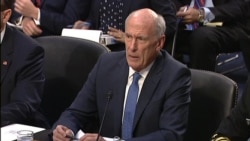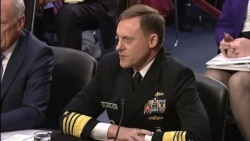Two top U.S. intelligence officials told lawmakers they did not feel inappropriately pressured by President Donald Trump to publicly disavow possible Russian collusion with Trump aides in last year's election.
But Director of National Intelligence Dan Coats and National Security Agency Director Michael Rogers told the Senate Intelligence Committee they would not discuss details of their White House meetings with Trump in recent months. They refused to answer questions about whether Trump asked them to intervene to curb the investigation of Russian interference in the 2016 campaign.
"I’ve never felt pressure, to intervene or interfere in any way shape, with shaping intelligence, in a political way," Coats said. "Or, in relationship to an ongoing investigation.”
A Washington Post report Wednesday said in March, less than a week after the Senate confirmed Coats to oversee the 17 U.S. intelligence agencies, Trump asked him to intervene with then-FBI Director James Comey to back off an investigation of Trump's first national security adviser, Michael Flynn, whom Trump fired after just 24 days on the job for lying to Vice President Mike Pence about his contacts with Russia's ambassador to Washington.
But Coats said it would be inappropriate to publicly discuss his White House talks with Trump, even though he said the White House had not sought to block discussion of his private conversations with the president
When pressed by one lawmaker to explain why he was refusing to answer questions about his conversations with the president, Coats replied, "I’m not sure I have a legal basis."
WATCH: Coats on whether he was asked to intervene in Russia probe
Rogers took the same stance against talking about his conversations with Trump, but denied feeling any pressure from the president to publicly downplay any Trump campaign connection to Russian officials.
"In the three plus years I have been director of the National Security Agency to the best of my recollection, I have never been directed to do anything I believe to be illegal, immoral, unethical or inappropriate," Rogers said. "And to the best of my recollection, during that same period of service, I do not recall ever feeling pressured to do so.”
WATCH: Rogers on whether Trump pressured him on Russia probe
Coats and Rogers testified on the first of two days of hearings focused on Trump's efforts to curb the investigation of what he says is a "witch hunt" aimed at undermining the legitimacy of his upset victory in the November election, an excuse he says opposition Democrats are using to account for his defeat of former U.S. Secretary of State Hillary Clinton.
Did Trump interfere?
On Thursday, Comey, whom Trump fired last month while he was heading the agency's Russia investigation, is set to testify before the same Senate panel. In an early release of his planned testimony, Comey said Trump in January asked the former FBI chief for personal loyalty and then, on the day after Trump fired Flynn in February, urged him to back off the FBI investigation of Flynn's Russia connections.
Trump, according to the Post's account, complained to Coats and Central Intelligence Agency chief Mike Pompeo about Comey's handling of the Russia probe. Coats discussed Trump's request with aides, but decided that intervening with Comey was inappropriate. As he decided to fire Comey, Trump said he was thinking of "this Russia thing."
Coats' and Rogers' testimony comes as a new Post-ABC News poll said a 56-percent majority of U.S. adults think Trump is interfering with several Russia investigations, while 61 percent think Trump fired Comey to protect himself rather than for the good of the country.
But the news organizations' survey also said Americans are skeptical about what Comey says about Russian meddling in the election. The FBI and other U.S. agencies said earlier this year Moscow interfered to help Trump win, but the poll said only 36 percent of those surveyed say they trust what Comey says about Russia "a great deal" or "a good amount."
But the survey also said only slightly more than one in five people trust what Trump says about Russia's role in the campaign.







